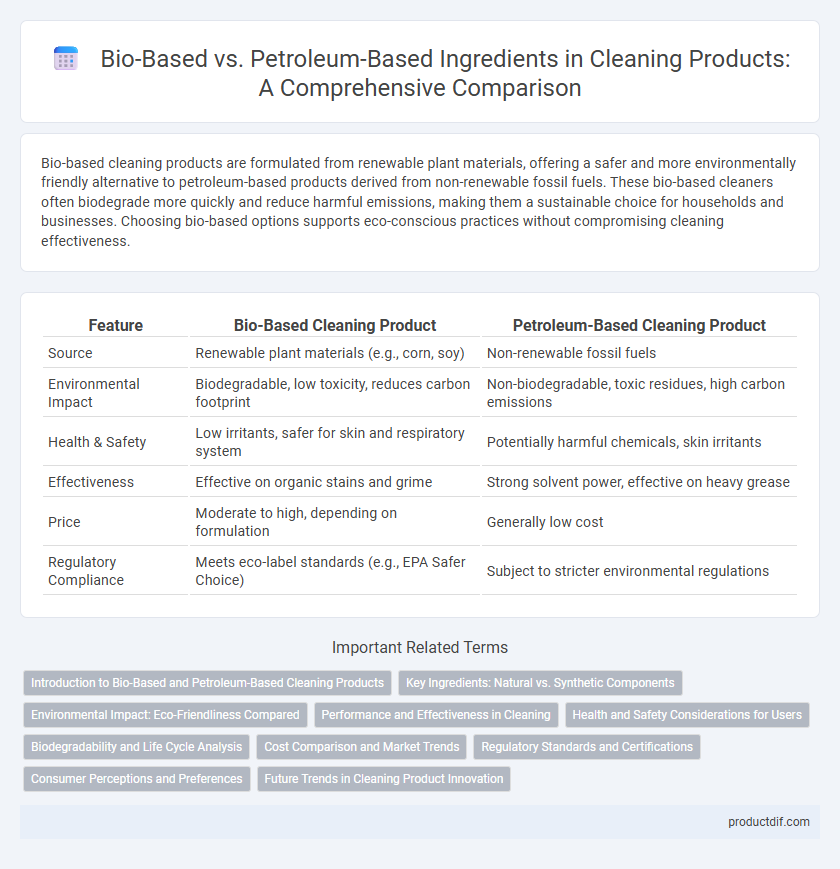Bio-based cleaning products are formulated from renewable plant materials, offering a safer and more environmentally friendly alternative to petroleum-based products derived from non-renewable fossil fuels. These bio-based cleaners often biodegrade more quickly and reduce harmful emissions, making them a sustainable choice for households and businesses. Choosing bio-based options supports eco-conscious practices without compromising cleaning effectiveness.
Table of Comparison
| Feature | Bio-Based Cleaning Product | Petroleum-Based Cleaning Product |
|---|---|---|
| Source | Renewable plant materials (e.g., corn, soy) | Non-renewable fossil fuels |
| Environmental Impact | Biodegradable, low toxicity, reduces carbon footprint | Non-biodegradable, toxic residues, high carbon emissions |
| Health & Safety | Low irritants, safer for skin and respiratory system | Potentially harmful chemicals, skin irritants |
| Effectiveness | Effective on organic stains and grime | Strong solvent power, effective on heavy grease |
| Price | Moderate to high, depending on formulation | Generally low cost |
| Regulatory Compliance | Meets eco-label standards (e.g., EPA Safer Choice) | Subject to stricter environmental regulations |
Introduction to Bio-Based and Petroleum-Based Cleaning Products
Bio-based cleaning products derive their ingredients from renewable biological sources such as plants and algae, offering a sustainable alternative to petroleum-based products, which are formulated from non-renewable fossil fuels. These bio-based cleaners often contain biodegradable compounds that reduce environmental impact and support green chemistry principles. Petroleum-based cleaning products typically provide strong performance and lower initial costs but contribute to pollution and resource depletion due to their synthetic chemical components.
Key Ingredients: Natural vs. Synthetic Components
Bio-based cleaning products incorporate natural components such as plant-derived surfactants, enzymes, and essential oils, which enhance biodegradability and reduce environmental impact. Petroleum-based products rely on synthetic chemicals like petrochemical surfactants and solvents, often resulting in higher toxicity and slower decomposition. The choice of natural versus synthetic ingredients directly influences product safety, efficacy, and ecological footprint.
Environmental Impact: Eco-Friendliness Compared
Bio-based cleaning products significantly reduce environmental harm by using renewable resources that biodegrade more rapidly, lowering toxic emissions and pollution. Petroleum-based cleaners rely on non-renewable fossil fuels, contributing to higher carbon footprints and persistent environmental contaminants. Choosing bio-based formulations supports sustainable manufacturing and minimizes ecological damage through reduced chemical persistence and enhanced biodegradability.
Performance and Effectiveness in Cleaning
Bio-based cleaning products often demonstrate comparable or superior performance to petroleum-based alternatives due to their natural enzymatic and surfactant components that effectively break down organic stains and grease. Petroleum-based products rely on synthetic chemicals which may offer strong immediate cleaning power but can leave residues and cause environmental harm. Studies show bio-based cleaners maintain high effectiveness in dissolving dirt while promoting biodegradability, making them a sustainable choice without compromising cleaning quality.
Health and Safety Considerations for Users
Bio-based cleaning products typically contain fewer toxic chemicals, reducing the risk of skin irritation, respiratory issues, and allergic reactions compared to petroleum-based counterparts. Petroleum-based products often emit volatile organic compounds (VOCs) that can negatively impact indoor air quality and pose long-term health hazards. Choosing bio-based formulations enhances user safety by minimizing exposure to harmful substances while maintaining effective cleaning performance.
Biodegradability and Life Cycle Analysis
Bio-based cleaning products demonstrate superior biodegradability compared to petroleum-based counterparts, breaking down more efficiently in natural environments and reducing ecological persistence. Life Cycle Analysis (LCA) reveals that bio-based products generally have a lower carbon footprint across production, use, and disposal phases, emphasizing renewable resource utilization and minimal toxic emissions. Petroleum-based products often involve intensive extraction and refining processes, leading to higher greenhouse gas emissions and environmental impacts throughout their life cycle.
Cost Comparison and Market Trends
Bio-based cleaning products generally have higher upfront costs compared to petroleum-based counterparts due to raw material sourcing and production scale limitations, but they benefit from increasing consumer demand driven by environmental awareness. Market trends indicate a consistent growth rate of over 10% annually for bio-based products, fueled by regulatory incentives and corporate sustainability goals. In contrast, petroleum-based products face fluctuating prices linked to crude oil markets and tightening environmental regulations, which may impact long-term cost stability and market share.
Regulatory Standards and Certifications
Bio-based cleaning products adhere to stringent regulatory standards such as USDA BioPreferred certification, which ensures a minimum renewable biobased content and promotes environmental sustainability. Petroleum-based products are regulated primarily by EPA standards focusing on chemical safety and environmental impact during manufacturing and disposal. Certifications like Ecocert and Green Seal favor bio-based formulations, highlighting reduced toxicity and biodegradability compared to many petroleum-derived alternatives.
Consumer Perceptions and Preferences
Consumers increasingly favor bio-based cleaning products due to their perceived environmental benefits and safety for health, associating them with natural ingredients and biodegradability. Petroleum-based products often face negative perceptions linked to chemical additives, potential toxicity, and environmental pollution, influencing a growing preference for sustainable alternatives. Market trends show a significant shift toward bio-based options as consumers prioritize eco-friendly attributes and demand transparency about product origins.
Future Trends in Cleaning Product Innovation
Bio-based cleaning products are gaining momentum due to their sustainable sourcing from renewable biomass, offering biodegradability and reduced toxic emissions compared to petroleum-based alternatives derived from non-renewable fossil fuels. Future trends emphasize the development of enzyme-enhanced formulations and plant-derived surfactants that improve cleaning efficacy while minimizing environmental impact. Manufacturers are also investing in circular economy models and carbon-neutral production processes to meet increasing consumer demand for eco-friendly cleaning solutions.
Bio-based product vs petroleum-based product Infographic

 productdif.com
productdif.com